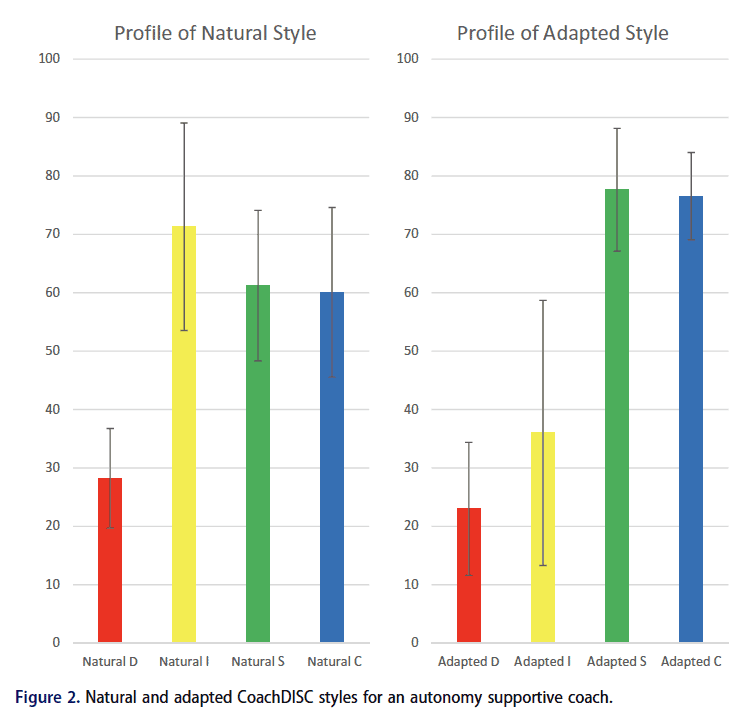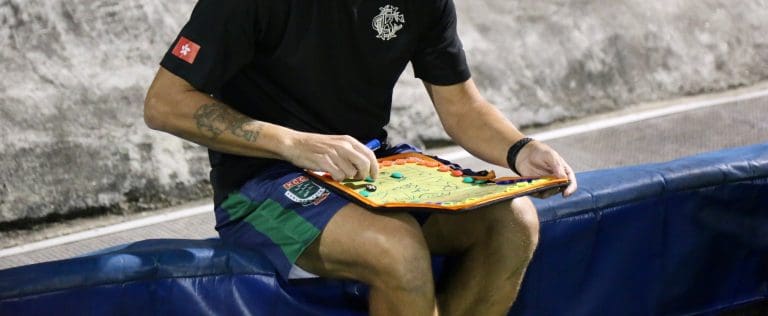Athlete Assessments are committed to contributing to coach development and have been recently involved in some research exploring the existence of autonomy-supportive coaching behaviors within our CoachDISC Profile assessment to help coaches reflect on and adapt their own coaching behaviors.
If you’d rather read all the nitty gritty details in the full paper, you can access it via the International Journal of Kinesiology in Higher Education. If not, find somewhere comfortable, settle down, and read on!
Motivation: how to move oneself or another to act.
How, as a coach, can I help my athlete find energy to mobilize and persist at a task? Motivation can come in many forms, externally like awards, fear of people’s opinions, or other reward systems, and internally like your interests, curiosity, challenges, or values. Self-determination theory focuses on the internal sources of motivation, such as our innate need for growth and fulfilment. In the sporting realm, this translates to a framework that allows coaches to better understand how to create a motivational climate that fosters more self-determined or intrinsic forms of motivation for their athletes.
Conducted by Georgia Southern Professor of Exercise Science & Coaching, Jody Langdon, West Virginia University Doctoral Student, Diane Benish, and Athlete Assessments’ CEO (and Doctoral Student at the University of the Sunshine Coast), Liz Masen, the research published in 2021 in the International Journal of Kinesiology in Higher Education concerned autonomy-supportive coaching behavioral styles and the enhancement of a pre-existing assessment, the CoachDISC Profile.
Autonomy-supportive coaching behaviors include:
- acknowledging athletes’ feelings and perspectives
- providing choice within specific rules and limits
- providing explanations for exercises, rules, and drills
- providing athletes with opportunity to take initiative and engage in independent work
- providing non-controlling competency feedback
- avoiding controlling behaviors
- preventing ego involvement
Research indicates the importance and effectiveness of autonomy-supportive coaching. Having coaches reflect on their coaching using specific assessments can help them recognize their behaviors and serve as a catapult for behavioral change.
Many coach development programs have tried to train coaches to be more supportive, aiming to improve their awareness at the intrapersonal level (their coaching practices) and the interpersonal level (their coach-athlete interactions). Unfortunately, it is often expensive and time-consuming to create independent learning materials that have no promise of continued use with the intended audiences. As such, the researchers at the heart of this investigation set out to address this problem by incorporating self-determination theory into the already established learning and profiling tool, the CoachDISC Profile.
The CoachDISC Profile is one of Athlete Assessments’ world first sport-specific DISC Profiles used to determine the behaviors demonstrated by an individual coach within their sporting environment. The assessment tool uses the four-quadrant DISC Model to measure the degree of four primary behaviors, Dominance, Influence, Steadiness, and Conscientious. You can read more information on Athlete Assessments’ suite of DISC Profiles here.
Specifically, the trio aimed to identify a consistent CoachDISC Profile of an autonomy-supportive coach, as identified by a panel of experts. After being instructed to frame their responses using seven behavioral definitions of an autonomy-supportive coach, 11 self-determination theory experts completed a CoachDISC Profile to determine whether a distinct profile would emerge.
Results found that a distinct, autonomy-supportive, and structured CoachDISC Profile emerged.
The natural style showed Influence as the highest factor, Steadiness, and Conscientious as the secondary factors, and Dominance as the lowest factor within the Profile. Conversely, the adapted style (perception of how one should behave while coaching) showed Steadiness as the highest factor with Conscientious as the secondary factor, Influence as the tertiary factor, and again Dominance as the lowest factor. To be clear, a coach does not have to have this exact profile to be a good coach. Rather, coaches can use this profile as a way to guide their reflective practices and adapt their behaviors as necessary, to support their athletes’ growth and performances.
For example, a coach has some athletes who have been struggling to bring energy to games after multiple losses throughout the season. The coach has taken their CoachDISC Profile, and their primary style is Dominance. Reflecting on how their directive style has not been effective with some of their athletes, the coach can try and adopt some of the behaviors of the autonomy-supportive profile, touching base with players individually and offering them an open line of support communication to allow for two-way feedback. This approach can open a dialogue to collaboratively plan for future performance.

How would an autonomy-supportive coach be described?
As described in Athlete Assessments’ CoachDISC Report, the coaching style of an autonomy-supportive coach combines accuracy and precision with energy in one’s arsenal and the patience to persevere. They are interested in producing quality results and will often go to great lengths to ensure that the results of their efforts are the best they can possibly achieve. A coach with this style will be observed as calm and rational, who values interpersonal skills. They are not assertive in style and will rarely be overly directive or dominant. Their ability to build strong coach-athlete relationships is achieved through consistency, sincerity, and their relaxed and cooperative approach. They acknowledge their athletes’ feelings and perspectives and provide non-controlling feedback. The coach’s high steadiness lends them to patience and a degree of persistence, while their corresponding high levels of Conscientious bring an interest in order with structure and precision. A coach with this profile will be neat, well-organized, and orderly. They are patient and provide their athletes with reassurance, and coaching decisions are made based on objective standards and with careful consideration.
So, what can we conclude?
Grounded in Self-determination theory, researchers discovered that a pre-existing tool, the CoachDISC, could identify a distinct Profile for an autonomy-supportive coach. Such coaches are able to create an environment that supports and nurtures an athlete’s intrinsic motivations which may ultimately improve their coach-athlete relationships and lead to greater on-field success. Coaches and coach developers can use the CoachDISC Profile to provide feedback and engage in reflective practices that are grounded in motivational theory.
Athlete Assessments’ DISC Profiles are designed for use on an individual or team level, and we provide tailored programs to complement this use. Learn more about Athlete Assessments’ products and services, or complete a CoachDISC Profile of your own.
Recommended Articles
Athlete Assessments is very excited to announce our recent involvement in a novel research project investigating the integration of DISC Behavioral Profiling in university sport management and coaching classes to help promote self-awareness, leadership skills, and knowledge that can be leveraged for a career in the sports industry.
Can a coach coach themself? It’s an interesting question to ponder. While the role of a coach is to constantly work with their athletes and team to develop and improve, and we know that coaches by nature and role can be excellent at developing others, what about when developing themselves?
Take note of the 2021 NACE Job Outlook Survey Results to put your students in a medal winning position. Most of 2020 and 2021 have seen an ever-changing and unstable environment around us, particularly for those in a university space. One thing is for sure, it just got a whole lot more competitive for graduating Sport Management students, and in fact all students.





